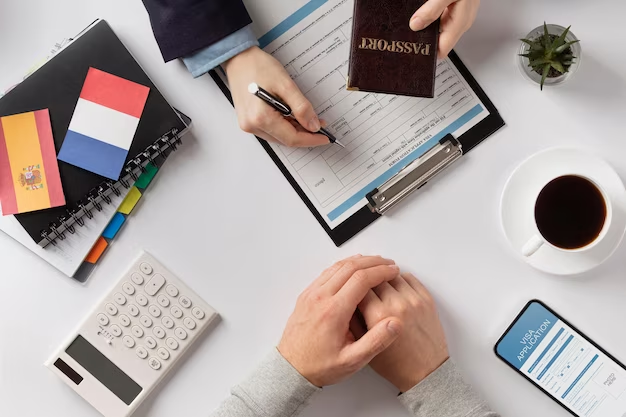How to process employment visa in UAE?
Securing employment in the United Arab Emirates (UAE) is an exciting prospect for many professionals around the world. However, to legally work and reside in the UAE, you must first obtain an employment visa. Processing a Dubai employment visa or any residence visa for working in the UAE can be intricate but manageable with the right guidance. This article, your essential visa guide, serves as a comprehensive blueprint, detailing each step from understanding the types of visas available to getting your documents in order, and working with a UAE sponsor.
Understanding UAE Employment Visas
An employment visa in the UAE is your legal pass to live and work in the Emirates. It’s tied to your job, meaning your employment is a prerequisite for the visa. Employment visas are usually valid for two or three years and must be renewed accordingly. There are several types of visas – some tailored for skilled professionals, others for investors or domestic workers, each with their specific eligibility criteria fitting the
The eligibility criteria for obtaining an employment visa in the UAE hinge upon not just personal qualifications and professional background but also on the fulfillment of the UAE’s visa policies at the time of application. Requirements may include a valid passport, a bona fide job offer, and a clean criminal record. Moreover, specific industries or designations may have additional criteria as governed by the Ministry of Human Resources and Emiratisation (MOHRE).
Preparing for Your Employment Visa Application
Before kicking off your application, ensure you have all necessary documents ready. These include your passport, your job offer letter or employment contract, educational and professional certificates, and a passport-sized photo, which must comply with UAE regulations. Here’s a basic list of what you will need to secure your Dubai employment visa:
- Original passport with a minimum six-month validity
- Job offer contract or employment agreement
- Educational and professional certificates, if required by the job position
- Medical clearance certificate
- ID photographs as per UAE specifications
It’s paramount that your legal documents, mainly your educational and professional certificates, are authenticated. This involves getting them certified by the issuing country’s Foreign Affairs department and the UAE embassy there. Sometimes, an additional step of getting them attested by the Ministry of Foreign Affairs in the UAE is required for your residence visa for working in the UAE.

The Role of Your UAE Sponsor
In the UAE, a sponsor is typically your employer, a UAE citizen, or a company who arranges your visa and, more often than not, your residence. The sponsor is responsible for taking care of the legalities involved in your Dubai employment visa process, including applying for an initial approval from the Ministry of Labour.
Sponsorship is a legal commitment, so ensure that your sponsor is reliable and has a good track record. An employer’s responsibility extends to many aspects of your stay in the UAE, including your healthcare and, should the need arise, the process of your repatriation.
Starting Your Visa Application Process
After gathering your documents and ensuring sponsorship, the visa application officially kicks off. The first steps involve acquiring an entry permit and getting initial approvals from the MOHRE. This is where your sponsor will usually take the lead.
Here’s a breakdown of the visa guide for application stages:
- Initial approval from MOHRE
- Entry permit issued, allowing you to legally enter the UAE
- Status adjustment (once you are in the country)
- Undergoing medical tests
- Visa stamping on your passport
You can follow the application’s progress through the online portal provided by the UAE government, ensuring transparency and real-time tracking of your application.
Medical Fitness and Biometrics
Upon entering the UAE with your employment visa, medical fitness tests are mandatory. You will visit an authorized health center for tests such as blood work and chest X-rays to rule out communicable diseases. Successful completion of these tests is an absolute necessity to proceed with your residence visa for working in the UAE.
After being deemed medically fit, you’ll proceed with biometric data collection. This includes fingerprinting and eye scans, which are part of the Emirate’s advanced security protocols. These measures are preventive and ensure the safety and health standards set by the country are maintained.
Visa Stamping and Emirates ID
Once medical tests and biometric data are successfully submitted and processed, the next crucial phase is the visa stamping. This procedure officially endorses your passport with the residence visa, marking your legality to work and reside in the UAE. The visa stamp is your green light, indicating that all governmental health and security checks have been satisfied.
This process is typically coordinated by your sponsor and can take anywhere from a few days to a couple of weeks. It’s important to be patient during this stage; any inquiries or concerns should be directed to your sponsor, who is familiar with the system and can provide updates.
After visa stamping, the next critical step is applying for an Emirates ID. The Emirates ID is an identification card that is essential for day-to-day activities in the UAE, such as opening a bank account or signing up for mobile phone services. The application process involves visiting an Emirates Identity Authority center with requisite documents and filling out the necessary forms.

Receiving Your Labour Card and Contract
The UAE labour card is an identification card that records your employment status and is issued by the MOHRE. Typically, your sponsor will handle the application for your labour card. Ensure that you have all necessary documents ready since you will likely be asked to supply supporting information.
Reviewing and signing your employment contract is an incredibly important step. The labour card and contract go hand-in-hand, and it is the contract that outlines your job role, salary, benefits, and other terms of employment. Make sure to thoroughly read the contract and understand your rights and obligations before signing. If there are any clauses or terms that are unclear, seek clarification or even legal advice if necessary.
Post-Visa Processing Steps
With a stamped visa, Emirates ID, and labour card in hand, you’re nearly ready to begin your new job in the UAE. But before you dive into work, there are a few additional steps you need to consider:
- Attend any mandatory orientation or training sessions provided by your employer or the UAE authorities. These sessions can be instrumental in helping you adjust to the work culture and regulations specific to the UAE.
- Familiarize yourself with the local customs and laws to ensure a smooth transition into your new environment. While the UAE is quite modern and expat-friendly, it holds certain cultural and legal standards that might differ from your home country.
Simultaneously, settling into your new life in the UAE involves tasks such as opening a local bank account, securing appropriate housing, and getting acquainted with the public transport system or obtaining a driving license if necessary.
Renewing or Cancelling Your Employment Visa
It’s essential to stay proactive with the expiration dates of your documents. For visa renewal, the process is similar to the initial application, and your employer will typically remind you when it’s time to renew. Here is some actionable advice for a seamless renewal:
- Start the renewal process well before your visa is set to expire, as delays can happen.
- Always verify that your passport has enough validity left for the visa period to avoid complications.
If you’re leaving your job and planning to return to your home country or move to another job within the UAE, it’s crucial to cancel your employment visa correctly. The procedure involves coordination with your employer, who will initiate the cancellation with the UAE authorities.
Expert Tips and Common Pitfalls
To ensure a smooth visa application process, keep communication lines open with your employer and be proactive about understanding each requirement. Regularly check the status of your application and be prepared for additional document requests or clarifications.
One of the common pitfalls is overlooking the validity of your passport, which can cause significant delays in the visa process. Also, failing to follow up on any discrepancies in your employment contract can result in misunderstanding your terms of employment, so stay vigilant and ask questions if unsure.

In a nutshell
Completing the journey to secure a UAE employment visa is a multifaceted process requiring preparation, attention to detail, and patience. As a future expatriate, make your checklist, double-check your documents, and maintain a positive outlook as you step into a new phase of your professional life. Keep this guide handy as a reference as you navigate through each step, and best of luck in your ventures in the UAE!
Frequently Asked Questions
What is the processing time for a Dubai employment visa?
The processing time can vary, typically ranging from a few weeks to a couple of months from start to finish, provided all documents are valid and correctly submitted.
Can I sponsor my family with a UAE employment visa?
Yes, once you have your employment visa, you can sponsor family members for their residence visas, subject to certain salary and accommodation requirements.
Are there any nationality-specific conditions for UAE employment visas?
While the fundamentals are similar, certain nationalities may have additional requirements or face restrictions, so it’s best to consult with the UAE embassy or your sponsor for specifics.
Is a medical examination mandatory for all UAE employment visa applicants?
Yes, all applicants must undergo and pass a medical examination in the UAE to prove they do not have any infectious diseases.
What should I do if my employment visa gets rejected?
Visa rejections can happen, and it’s important to understand the reason for rejection. Depending on the grounds, you or your sponsor can address the issue and reapply, or in certain situations, appeal the decision.







